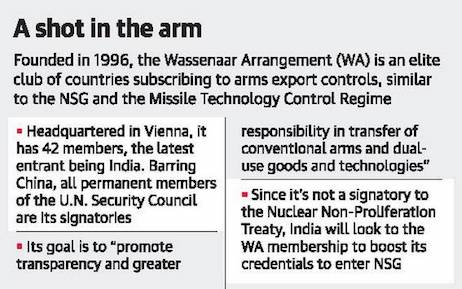Wassenar Arrangement and India
| Line 12: | Line 12: | ||
[http://www.thehindu.com/news/international/what-is-wassenaar-arrangement/article21297847.ece December 6, 2017: ''The Hindu''] | [http://www.thehindu.com/news/international/what-is-wassenaar-arrangement/article21297847.ece December 6, 2017: ''The Hindu''] | ||
| − | [[File: Wassenar Arrangement- some facts, in brief.jpg|Wassenar Arrangement- some facts, in brief <br/> From: [http://www.thehindu.com/news/national/india-gets-admission-into-wassenaar-arrangement/article21347560.ece | + | [[File: Wassenar Arrangement- some facts, in brief.jpg|Wassenar Arrangement- some facts, in brief <br/> From: [http://www.thehindu.com/news/national/india-gets-admission-into-wassenaar-arrangement/article21347560.ece December 8, 2017: ''The Hindu'']|frame|500px]] |
| Line 44: | Line 44: | ||
=December 2017: India given membership= | =December 2017: India given membership= | ||
| − | [http://www.thehindu.com/news/national/india-gets-admission-into-wassenaar-arrangement/article21347560.ece | + | [http://www.thehindu.com/news/national/india-gets-admission-into-wassenaar-arrangement/article21347560.ece December 8, 2017: ''The Hindu''] |
Wassenar Arrangement, an elite export control regime decided to admit India as its new member, which is expected to raise New Delhi’s stature in the field of non-proliferation besides helping it acquire critical technologies. The decision was taken at the two-day plenary meeting of the grouping in Vienna. | Wassenar Arrangement, an elite export control regime decided to admit India as its new member, which is expected to raise New Delhi’s stature in the field of non-proliferation besides helping it acquire critical technologies. The decision was taken at the two-day plenary meeting of the grouping in Vienna. | ||
Revision as of 11:58, 9 December 2017
This is a collection of articles archived for the excellence of their content. |
Introduction

From: December 8, 2017: The Hindu
What is Wassenaar Arrangement?
The Wassenaar Arrangement is an elite club of countries which subscribe to arms export controls, similar to the Nuclear Suppliers Group and the Missile Technology Control Regime.
The body came into being in 1996 to succeed the Cold War-era Coordinating Committee for Multilateral Export Controls. The name comes from Wassenaar, a suburb of The Hague, where the agreement to start such a multi-lateral cooperation was reached in 1995.
Who are all members of the Wassenaar Arrangement?
The WA has 42 members, the latest entrant being India. With the exception of China, all the other permanent members of the U.N. Security Council are signatories of the WA, which is headquartered in Vienna.
How does the Wassenaar Arrangement work?
According to the WA website, the goal of the Arrangement is to "promote transparency and greater responsibility in transfers of conventional arms and dual-use goods and technologies". Participants are required to "ensure that transfers of these items do not contribute to the development or enhancement of military capabilities which undermine the goal". The aim, according to WA, is also to prevent the acquisition of these items by terrorists.
What are Wassenaar Control Lists
The Arrangement works according to what it calls WA Control Lists. The controls are subject to ratification by the participants. WA members agree to exchange information on sensitive dual-use goods and technologies and report on such transfers and denials of controlled items to non-participants.
What does this mean to India?
Since it’s a non-signatory of the Nuclear Non-Proliferation Treaty, India would look up to the WA membership to boost its credentials to enter NSG. Crucially, China, which stands in the way of India’s NSG entry, is not a member of WA.
Are there any catches?
Critics see WA simply as a Cold War instrument with a different name. According to them Arrangement perpetuates a digital divide by restricting western companies and governments from supplying crucial technologies to emerging markets. Computer scientists and policy analysts have also expressed concern about developed economies using less developed countries as Guinea Pigs for their cyber security research by supplying them with intrusive technologies that could be used for mass surveillance.
The Electronic Frontier Foundation, a digital rights group, has accused the United States of going for even narrower restrictions on technology transfer.
December 2017: India given membership
Wassenar Arrangement, an elite export control regime decided to admit India as its new member, which is expected to raise New Delhi’s stature in the field of non-proliferation besides helping it acquire critical technologies. The decision was taken at the two-day plenary meeting of the grouping in Vienna.
The WA membership is also expected to build up a strong case for India’s entry into the 48-member Nuclear Suppliers Group (NSG). Significantly, China, which stonewalled India’s entry into the 48-nation NSG, is not a member of the Wassenaar Arrangement.
Space, defence to gain from entry to export control regime
The Ministry of External Affairs welcomed the decision of the Wassenaar Arrangement to admit India as the 42nd member of the organisation which aims to regulate trade and use of dual use technology.
Officials said that following admission into the club, India will get access to high technology, which will help address the demands of Indian space and defence sectors.
It will also boost New Delhi’s chances of joining the Nuclear Suppliers Group (NSG).
“The Plenary meeting of the Wassenaar Arrangement (WA) held on 6 to 7 December 2017 in Vienna, Austria, has decided to admit India, which will become the Arrangement’s 42nd participating state. The necessary procedural arrangements for India’s admission will be completed shortly,” the spokesperson for the Ministry of External Affairs said at his weekly briefing.
On the scope of the Arrangement, he said, “India’s membership is expected to facilitate high technology tie-ups with Indian industry and ease access to high-tech items for our defence and space programmes.”
The MEA spokesperson said, “While membership of the Arrangement would not automatically entail any preferential treatment from other WA members, it would create the grounds for realignment of India in the export control policy framework of other WA members, including eligibility for certain licensing exceptions.”
Membership in the Arrangement has been part of India’s quest for membership in the export control organisations.
The Hindu had earlier reported that Russia had expressed optimism about India’s membership in the Wassenaar Arrangement. Deputy Foreign Minister Sergey Ryabkov had said earlier this week that Russian support for Indian membership in the organisation will help bilateral ties, and added, “This is an example and reflection of Russia’s unwavering support to India’s membership of international nuclear control regimes.”